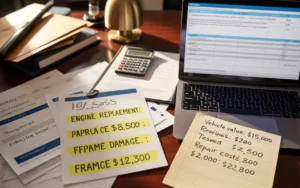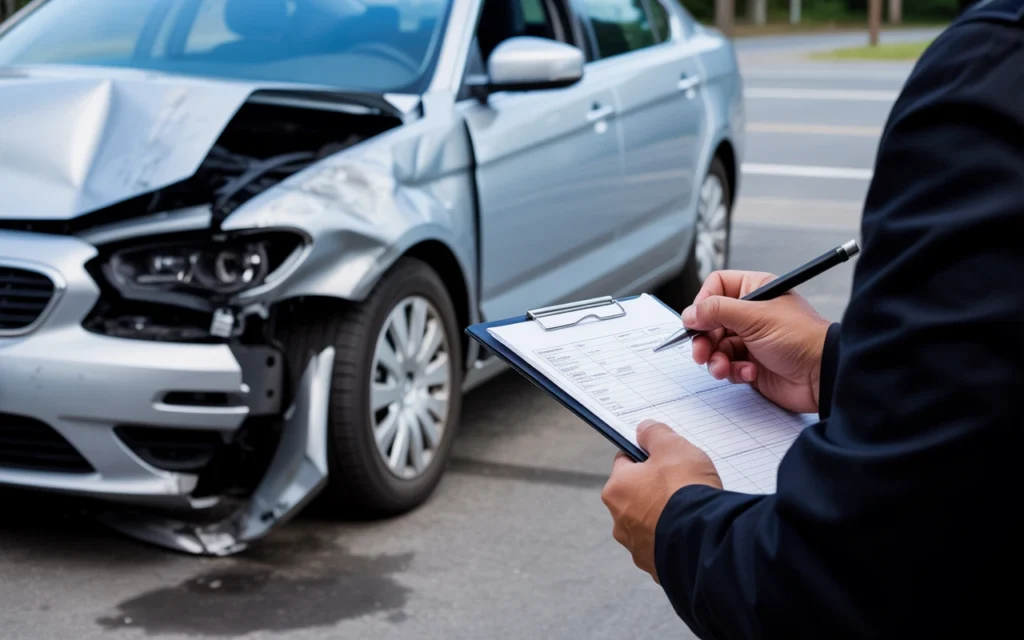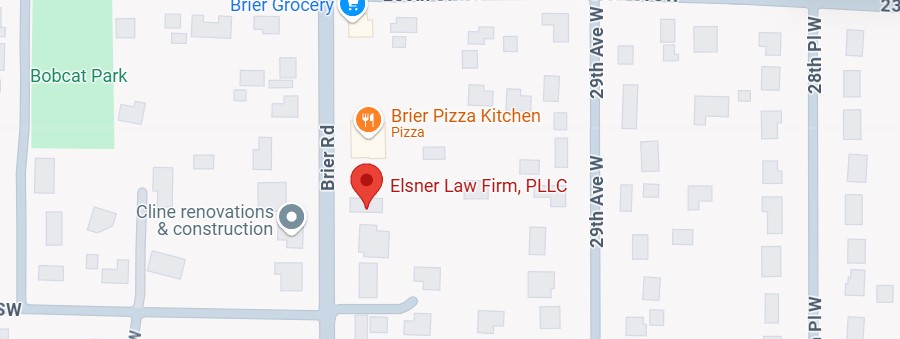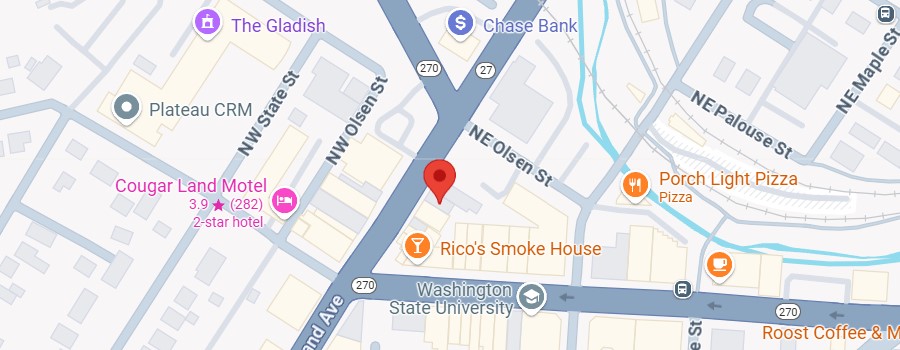When Is a Car Considered Totaled in Washington State?
A serious car accident can leave you shaken, stressed, and unsure of what comes next. When an insurance company starts talking about “totaling” your car, it often happens fast before you’ve had time to process the accident, understand your rights, or feel emotionally stable.
If you’re feeling anxious, pressured, or confused right now, you are not alone. At Elsner Law Firm, we help accident victims across Washington State take a breath, regain control, and protect themselves from insurance not always your side. We step in so you don’t have to face the insurance company on your own.
With over 17 years of experience handling Washington car accident and insurance claims, our team knows how insurers decide when a car is totaled and how to challenge those decisions when they’re wrong.
In this blog, you’ll learn:
- When a car is legally considered totaled in Washington State
- How insurance companies apply the Washington Total Loss Formula
- How to tell if your car may be considered a total loss
- What factors influence an insurance company’s decision
- What options you have if you disagree with the insurer
By the end of this guide, you’ll have clarity, confidence, and a better understanding of how to protect yourself after a serious accident.
Why You Might Need a Lawyer After Your Car Is Totaled
When your car is declared a total loss, the situation can be confusing and stressful. Many people don’t realize how complex insurance rules can be, and mistakes or miscalculations can cost you thousands. You might consider benefits of hiring an attorney if you notice any of the following:
- Confusing insurance language: Policies and valuation reports often include terms that are difficult to understand.
- Disputed vehicle value: If you feel the insurance company’s estimate of your car’s worth is too low.
- High repair costs or hidden damage: Repairs that approach or exceed your vehicle’s actual cash value can trigger important legal questions.
- Insurance delays or pressure tactics: Adjusters may rush decisions, fail to respond promptly, or push for a quick settlement.
- Coverage gaps or disputes: You may have collision, uninsured motorist, or other policy concerns that affect your payout.
- Peace of mind: Even if everything seems straightforward, a lawyer can help ensure your rights are protected and that you fully understand your options.
In short, anytime you feel unsure about the fairness, legality, or accuracy of your insurance claim, consulting a lawyer can provide clarity, protect your interests, and help you make informed decisions.
What Does It Mean When a Car Is “Totaled”?
A car is considered totaled when the insurance company determines that repairing the vehicle is not economically reasonable compared to its value immediately before the accident.
Unlike some states, Washington does not rely on a fixed damage percentage. Instead, insurers must apply a legally recognized calculation known as the Total Loss Formula (TLF).
What Is the Total Loss Threshold in Washington State?
Many drivers search for the Washington State total loss threshold expecting a specific percentage. However, Washington does not use a fixed percentage threshold to total vehicles.
Instead, insurers must apply the Total Loss Formula (TLF).
Washington Total Loss Formula Explained:
- Repair cost: The estimated total cost to restore the vehicle, including labor, replacement parts, and safety system repairs.
- Salvage value: The amount the damaged vehicle could reasonably sell for in the salvage or auction market.
- Actual Cash Value (ACV): The vehicle’s fair market value immediately before the accident occurred.
If repair cost plus salvage value is equal to or greater than the ACV, the vehicle is legally considered a total loss in Washington.
How Washington Differs From Other States
Some states’ total vehicles once repair costs reach 70%–80% of the car’s value. Washington’s formula-based approach means a vehicle may be totaled in rear end collision even when the visible damage does not appear extreme.

How Do Insurance Companies Calculate If a Car Is Totaled?
To apply the Total Loss Formula, insurance companies must calculate three key values.
Actual Cash Value (ACV)
The ACV represents what your car was worth immediately before the accident, not what it cost new or what it would cost to replace today. Insurers determine ACV by reviewing:
- Vehicle make, model, and year: These establish the vehicle’s market category and baseline value.
- Mileage: Higher mileage generally reduces value due to increased wear.
- Pre-accident condition: Prior damage, maintenance history, and overall condition affect valuation.
- Local market data: Comparable vehicle pricing within Washington and Seattle-area markets.
Car owners have the right to request and review the ACV valuation report used by the insurance company.
At Elsner Law Firm, we routinely review insurance valuation reports for Washington car accident claims and identify errors that can significantly reduce a vehicle’s ACV. Our experience allows us to recognize when insurers undervalue vehicles or misuse local market comparisons.
Repair Costs
Repair estimates typically include:
- Labor and parts: Standard and specialty repair work required to restore the vehicle.
- Structural repairs: Damage to the frame or chassis that affects safety.
- Safety system replacement: Airbags, sensors, and electronic safety components.
- Hidden damage: Problems discovered after teardown and detailed inspection.
Salvage Value
Salvage value reflects:
- Market demand for damaged vehicles: What salvage buyers are willing to pay.
- Reusable parts: Engines, transmissions, and other components with resale value.
- Vehicle age and condition: Older vehicles often carry higher salvage ratios relative to ACV.
How Do I Know If My Car Is Considered Totaled?
While only an insurer can officially declare a total loss, several warning signs may indicate your car is totaled:
- Airbag deployment: Often signals significant impact and costly safety repairs.
- Frame or structural damage: Damage that compromises the vehicle’s integrity.
- Repair estimates nearing vehicle value: Costs approaching or exceeding ACV.
- Severe safety system damage: Electronic and sensor failures that are expensive to replace.
- Insurance adjuster delays: Extended review periods may signal a total loss evaluation.
If you notice these signs, request the insurer’s ACV and total loss valuation report.
What Factors Determine Whether a Car Is Totaled?
Insurance companies consider more than visible damage, including:
- Structural damage: Frame or chassis issues affecting long-term safety.
- Safety system impact: Airbags, collision sensors, and electronics.
- Parts availability: Delays or shortages that increase repair costs.
- Pre-accident condition: Wear, prior repairs, and maintenance history.
- Salvage market value: The resale potential of the damaged vehicle.
Together, these factors determine whether repairs are financially reasonable.
When Do Insurance Companies Decide to Total a Car?
Insurance companies generally total a vehicle when:
- The Total Loss Formula is met: Repair costs plus salvage value equal or exceed ACV.
- The vehicle cannot be safely restored: Repairs would not return it to pre-accident safety standards.
- Repair timelines are excessive: Parts shortages or labor delays make repairs impractical.
- Long-term reliability is compromised: Structural damage presents ongoing risk.
Step-by-Step: How to Determine If Your Car Might Be Totaled
- Obtain a repair estimate: Request a written estimate from a certified repair shop.
- Request the ACV calculation: Ask how your vehicle’s value was determined.
- Review the valuation report: Examine comparable sales and condition adjustments.
- Apply the Total Loss Formula: Compare ACV against repair cost plus salvage value.
- Request a second appraisal: If your policy allows and you dispute the valuation.
- Consult a Seattle car accident lawyer: If the insurer refuses to act fairly.
What If I Totaled My Car Without Collision Coverage?
If you do not have collision coverage, your options depend on fault:
- Not at fault: You may file claim with at-fault insurance.
- Uninsured or underinsured driver: Uninsured motorist coverage may apply.
- At fault: You may be responsible for the loss unless other coverage applies.
If you are facing a total loss without collision coverage, legal guidance can be critical. Elsner Law Firm offers free, no-obligation consultations and works on a contingency fee basis meaning you pay nothing unless compensation is recovered.
Can You Sell a Totaled Car in Washington State?
Yes, but Washington law requires specific steps:
- Salvage title issuance: Totaled vehicles receive a salvage designation.
- Selling options: Vehicles may be sold to junkyards, salvage dealers, or private buyers.
- Disclosure obligations: Sellers must disclose salvage status to buyers.
- Parts resale: Some owners recover value by selling usable components.
Failure to follow disclosure rules can result in legal consequences.
How Is Car Value Calculated for Insurance Claims in Washington?
Insurance companies calculate ACV using:
- Comparable local vehicle sales: Prices of similar vehicles recently sold in Washington or the Seattle area.
- Vehicle condition adjustments: Modifications based on mileage, wear, and pre-accident condition.
- Market demand: Local supply and demand factors, which often raise values in urban markets like Seattle.
Because Elsner Law Firm represents clients throughout the Seattle area and across Washington State, we frequently see ACV disputes caused by insurers undervaluing vehicles in high-demand markets.
Does Every State Use the Same Total Loss Rule?
No. Total loss laws vary by state:
- Percentage-based states: Some states total vehicles at 70%–80% damage thresholds.
- Formula-based states: Washington uses the Total Loss Formula instead.
- Practical impact: The rule used can significantly affect settlement amounts.

What Happens After Your Car Is Totaled?
Once a vehicle is declared totaled:
- Insurance pays ACV: Minus any applicable deductible.
- Taxes and fees included: Sales tax, title, and licensing costs must be covered.
- Loan balances addressed: Payments go to lenders first if a loan exists.
- Salvage retention option: Owners may keep the vehicle with a reduced payout and state inspection requirement.
Why Choose Elsner Law Firm for a Totaled Car Claim?
When your vehicle is declared a total loss, the insurance company’s goal is often to settle quickly and pay as little as possible. Our goal is different: to protect you, reduce your stress, and secure the full compensation you are entitled to under Washington law.
Here’s how Elsner Law Firm helps clients facing totaled car disputes:
We handle insurance companies so you don’t have to:
Insurance adjusters are trained to minimize payouts. We step in to manage all communication, negotiations, and paperwork, preventing insurers from pressuring you into unfair settlements.
We challenge undervalued vehicle calculations:
We carefully review ACV reports, comparable vehicle data, and salvage calculations to identify errors that could significantly reduce your payout especially common in Seattle-area markets.
We understand Washington’s total loss laws:
Our firm has deep knowledge of Washington’s Total Loss Formula and insurance regulations, allowing us to spot when insurers misuse the formula or apply it unfairly.
No upfront costs, no financial risk:
We work on a contingency fee basis, meaning you pay nothing unless we recover compensation for you. This allows you to get help without added financial pressure.
Compassionate, personal support:
Clients often tell us they feel relief after a car accident after speaking with our team. We treat every case with care, empathy, and clear communication because your peace of mind matters.
Proven experience and results:
Since 2007, we have represented thousands of injured clients across Washington State and successfully fought lowball insurance offers, often increasing settlements multiple times over the initial amount.
When your car is totaled, it’s not just about a vehicle it’s about your stability, finances, and recovery. Having the right legal team can make all the difference.
Frequently Asked Questions About Totaled Cars
The following answers reflect how Washington insurance laws are applied in real claims, based on our experience representing accident victims statewide.
What makes a car totaled in Washington State?
A car is totaled when repair costs plus salvage value equal or exceed its ACV.
Is there a specific percentage used in Washington State?
No. Washington does not use a fixed percentage threshold.
Does frame damage mean the car is totaled?
Not always, but frame damage greatly increases the likelihood.
Can I ask insurance to total my car?
You may request a review, but insurers must follow the Total Loss Formula.
Should I accept the first offer for my totaled car?
Not necessarily. You can dispute the valuation and request documentation.
Take Control After Your Car Is Totaled
Dealing with a totaled car can feel overwhelming especially when insurance companies move fast and answers are hard to come by. You should not have to guess whether your car was valued correctly or worry about being pressured into an unfair settlement.
If you have questions, concerns, or simply want clarity, Elsner Law Firm is here to help. Our team has spent more than 17 years standing up for accident victims across Washington State, ensuring insurance companies follow the law and treat people fairly.
Call or text 206-447-1425 today for a free, no-obligation consultation.
We are available 24/7, charge no upfront fees, and you pay nothing unless we recover compensation for you.
You don’t have to face this alone. Let us help you move forward with confidence.






